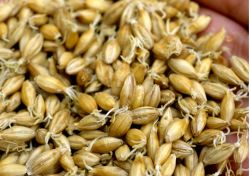Did you know that the Scottish have a $6.2 billion a year whiskey habit? I didn’t until I came across an article in the Guardian about how researchers in Edinburgh Napier University are researching turning whiskey waste into butanol. During the whiskey distillation process, two main waste products are created – pot ale, a liquid, as well as draff, which are the remains of grains used when distilling the alcohol. These are now being turned into biofuel.
 Unlike ethanol, researchers are finding that butanol gives 30 percent more power output than ethanol and can be used in conventional vehicles without engine modifications. They also like the fact that no “food” products are used in the creation – only waste and say that the process is more environmentally sustainable than other forms of ethanol production.
Unlike ethanol, researchers are finding that butanol gives 30 percent more power output than ethanol and can be used in conventional vehicles without engine modifications. They also like the fact that no “food” products are used in the creation – only waste and say that the process is more environmentally sustainable than other forms of ethanol production.
The European Union has set a goal that biofuels should account for 10 percent of all fuel sales by 2010 but this regulation has been under fire recently as concerns have continued to surface over using grains for biofuels in addition to land use and soil sustainability issues. In fact, England has actually scaled back on their biofuels goals and other countries are considering following suit unless they determine that other feedstocks will be more sustainable.
Regardless, turning alcohol waste into biofuels is not a new concept – Coors has been doing this in one of their breweries in Colorado for several years. Well, I can’t help but wonder if a new drinking saying will be. “I drink so that I can drive on biofuels.”

